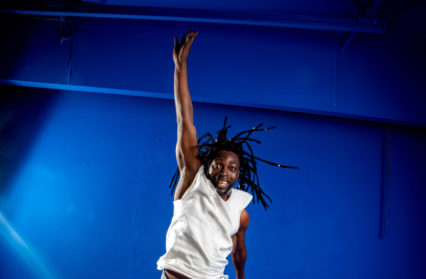Caragh Medlicott reviews Spirit of Nimba, an explosive new dance show from Idrissa Camara telling a story of lockdown survival.
Lockdown was many things to many people. For some of us, the extra time at home meant space to pursue new hobbies (for a time, the ratio of sourdough loaves to people was unusually off-kilter), as well as the space to refocus (whether on creative activities or TV binges). If your favoured form of personal expression can be achieved at a desk, then even lockdown could do little to truly blockade your path. But what about those whose passions take a different form? For the performing arts, the pandemic was disastrous. We know this well on a cultural and financial level, but it was something felt on a personal front by the performers who were suddenly out of work and cut off from doing what they love most. For Idrissa Camara, this predicament was only intensified by a foot infection – something he dubs “the worst thing that can happen to a professional dancer” – which left him not only unable to dance, but unable to walk too. Luckily for us, Camara (now fully healed), has channelled the anguish of his experience into something bold and beautiful: The Spirit of Nimba – a dance show woven from a rich tapestry of human emotion.
The dance begins with Camara sprawled over in collapse. Opening in silence, the music slowly begins to swoon in – drums rattling and violin singing – we see Camara repeatedly struggle to raise himself up only to convulse and fall back down again and again. Arms lifted like wings, shoulders rolling like cogs, an intermingling of pain and determination is viscerally expressed in Camara’s passionate movement. As the lighting changes, the tempo shifting, a pair of dancers (Ofelia Balogun and Kim Noble) enter the stage – one reading, another miming at jabbering on the phone. It’s not long before Camara has tempted them away from the banality of the everyday into the electric world of dance. One of The Spirit of Nimba’s great strengths is its humour and self-reference, Camara making affectionate jokes about the people of Cardiff who like to “talk on the phone” and “drink coffee, coffee, coffee at Chapter Arts Centre”. The narrative and its relationship with Camara’s own lockdown experience moves in and out of view but, with Edward Amoateng Manu joining the dancing cast on stage, the vitality of performance carries the audience along in a wave of unbridled joy and poignant self-expression.
The abstraction of The Spirit of Nimba is felt, too, in its eclecticism. Here, music does not take a backseat. Not least because of Camara’s celebration of the Bolon, a traditional Guinean instrument which he credits with getting him through the dark days of injury and isolation in lockdown. The musicians – Mark O’Connor on the drums, Lucy Rivers on the violin, and Suntou Susso who is nothing short of magnificent on the kora – feel as much a part of this performance as the dancers themselves. Interludes of ethereal Welsh singing from Rivers blends West African culture with a Wales influence, harmonsing both elements through the connective tissue of joy and distress – the passing weather of emotions which The Spirit of Nimba ultimately characterises as less important than the momentum to just keep going. While the stage is kept clear for instruments and movement, single strikes of light in vivid primary colours seem to foretell the changes of tone in the music to follow. As for the dancing itself, it is explosively animated – charged with electric vigour of seemingly endless supply (there are hurricanes jealous of this cast’s relentless energy). Technical mastery is enlivened by an atmosphere of artful naturalism and what, at times, appears to be gleeful improvisation.
Believe me when I say this critic is not easily prized from the comfort of her seat – but charisma of this calibre mixed with the intoxication of live music can do something funny to a woman. Closing with abandoned seats and a sea of arms waving in the air – this is dance as it should be experienced, a true transcension of intellectualism; a vivid and optimistic appeal to the core of human experience.
Find out more about Spirit of Nimba here.



 Enjoyed this article? Support our writers directly by buying them a coffee and clicking this link.
Enjoyed this article? Support our writers directly by buying them a coffee and clicking this link.








